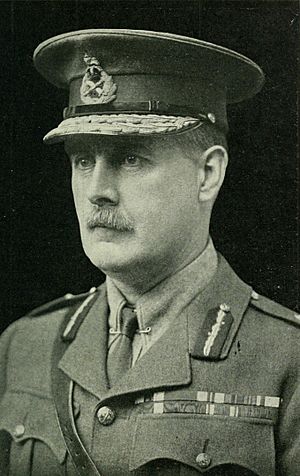George Macdonogh facts for kids
Quick facts for kids
Sir George Macdonogh
|
|
|---|---|
 |
|
| Born | 4 March 1865 Sunderland |
| Died | July 10, 1942 (aged 77) Teddington |
| Allegiance | |
| Service/ |
|
| Years of service | 1884–1922 |
| Rank | Lieutenant-General |
| Battles/wars | World War I |
| Awards | Knight Grand Cross of the Order of the British Empire Knight Commander of the Order of the Bath Knight Commander of the Order of St Michael and St George Knight's Cross of the Order of St. Sylvester |
Lieutenant-General Sir George Mark Watson Macdonogh (4 March 1865 – 10 July 1942) was an important British Army general officer. He started his career in the Royal Engineers, which is a branch of the army focused on engineering and technical tasks. Before World War I, he became a staff officer, helping to plan and organize military operations. His most important job during the war was leading the Military Intelligence department at the War Office from 1916 to 1918.
Early Life and Military Start
George Macdonogh was born on March 4, 1865. His father worked at the Royal Naval Hospital in Greenwich. George joined the Royal Engineers as a second lieutenant in 1884. He was known for being very smart, though a bit quiet. He was promoted to captain in 1892.
In 1896, he went to Staff College, a special school for army officers to learn advanced military planning. He did so well that his results were kept secret to hide how much better he was than other students. While studying there, he also studied law and became a barrister (a type of lawyer) in 1897.
Macdonogh could speak several Scandinavian languages fluently. He married Aline Borgstrom in 1898. They had one son, who sadly passed away in 1915.
Before the war, he held several important roles. He worked with the Royal Engineers in Dublin and later at the School of Military Engineering. He was promoted to major in 1901 and later to lieutenant-colonel in 1909 and colonel in 1912. He became the head of a department that planned how to control foreign citizens in case of war.
World War I and Key Roles
When World War I began in August 1914, George Macdonogh became a senior intelligence officer at the British Expeditionary Force Headquarters. He was promoted to Brigadier-General in November 1914. He was very good at predicting where enemy troops would move, which was crucial during battles like the First Battle of Ypres. He also successfully predicted a German gas attack in December 1915.
In January 1916, he was promoted to major-general and became the Director of Military Intelligence at the War Office in London. This was a very important job. By 1917, he had a very clear understanding of the entire German Army's strength and positions on the Western Front. He also helped create a special department called MI7(b), which worked on creating propaganda to lower the morale of the German public.
Macdonogh sometimes had disagreements with other military leaders, like Field Marshal Haig. He provided information to the government that suggested the German army was not as weak as some believed. Despite some differing opinions, he accurately predicted the date, time, and location of a major German attack in March 1918, known as "Michael".
In January 1918, he was appointed Adjutant-General to the Forces, a role he held until 1922. He was promoted to temporary lieutenant-general in 1919 and then to permanent lieutenant-general in 1922. He retired from the army in 1925.
He received several important awards for his service, including the Knight Commander of the Order of St Michael and St George (KCMG) in 1917, and the Knight Grand Cross of the Order of the British Empire (GBE) when he retired.
Life After the Military
After leaving the army, Sir George Macdonogh continued to be very active. He served on a special committee that looked at how local governments worked from 1923 to 1929. He also held many leadership positions in businesses, banks, and manufacturing companies. He was even the President of the Federation of British Industries from 1933 to 1934.
He was also a Commissioner for the Imperial War Graves Commission, which looks after the graves of soldiers. He was involved with the London Zoological Society (which runs the London Zoo) and the Royal Institute of International Affairs, a group that studies global issues.
During the Winter War (1939–1940), when Finland was attacked by the Soviet Union, he showed his support for Finland. He was the President of the Anglo-Finnish Society and helped with fundraising efforts for Finland.
Death
Sir George Macdonogh passed away on July 10, 1942, in Teddington, Middlesex. He left behind a significant estate, showing his success in his later business ventures.
 | Calvin Brent |
 | Walter T. Bailey |
 | Martha Cassell Thompson |
 | Alberta Jeannette Cassell |

